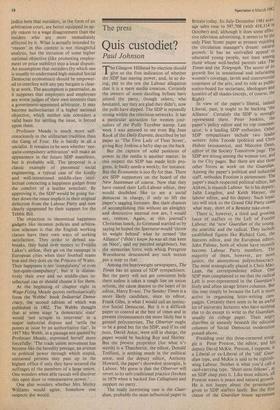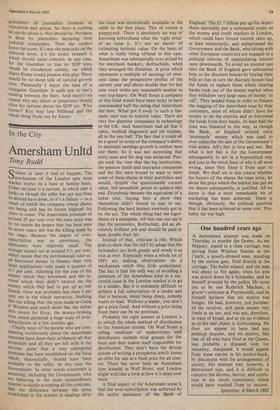The press
Quis custodiet?
Paul Johnson
The Glasgow Hillhead by-election should give us the first indication of whether the SDP has staying power, and, in so do- ing, put to the test the Labour allegation that it is a mere media creation. Certainly the owners of some dazzling bylines have joined the party, though others, who hesitated, say they are glad they didn't, now the polls have dipped. The SDP is reputedly strong within the television networks. It has a particular attraction for women jour- nalists of the Polly Toynbee stamp. Last week I was amused to see even Big Jean Rook of the Daily Express, described by her paper as 'The First Lady of Fleet Street', giving Roy Jenkins a hefty slap on the back.
But the capture of solid positions of power in the media is another matter. In this respect the SDP has made little pro- gress. It badly needs a weekly, for instance. But the Economist is too fly for that. There are SDP supporters on the board of the New Statesman of course. Now that they have ousted their Left-Labour editor, they would doubtless like to see a social' democrat in charge, if only to lift the paper's sagging fortunes. But their chances of accomplishing this without an almighty and destructive internal row are, I would say, remote. Again, at this journal's Christmas lunch, Jo Grimond startled us by saying he hoped the Spectator would 'throw its weight behind' what he termed 'the Alliance' ('didn't know Jo was all that keen on Nato', said my puzzled neighbour), but the stentorian force with whicb Peregrine Worsthorne denounced any such notion put a stop to that.
Among the heavyweight newspapers, The Times has its quota of SDP sympathisers. But the party will not get consistent help there unless it takes a tough line on union reform, the cause dearest to the heart of its editor, Harry Evans. The Sunday Times is a more likely candidate, since its editor, Frank Giles, is what I would call an instinc- tive Social Democrat. But it is a difficult paper to control at the best of times and in present circumstances the more likely line is genteel polycentrism. The Observer ought to be a good bet for the SDP, and if its old boss, David Astor, were still in charge, the paper would be backing Roy and Shirley. But the present proprietor (for what it's worth) is a Thatcherite, the editor, Donald Trelford, is nothing much in the political sense, and the deputy editor, Anthony Howard, the paper's shrewdest strategist, is Labour. My guess is that the Observer will revert to its safe traditional practice (broken in 1979 when it backed Jim Callaghan) and support no party.
The really interesting case is the Guar- dian, probably the most influential paper in Britain today. Its July-December 1981 aver- age sales rose to 397,708 (with 418,114 in October) and, although it does some effec- tive television advertising, it seems to be the only Fleet Street paper at present enjoying the circulation manager's dream: natural growth. It has an unrivalled appeal to educated young people, not least among those whose well-heeled parents take The Times and the Telegraph. The secret of its growth lies in sensational and infuriating women's coverage, lavish and controversial treatment of the arts, and its role as public notice-board for sectarians, ideologues and lunatics of all shades (except, of course, the Right). In view of the paper's liberal, indeed Liberal, past, it ought to be backing 'the Alliance'. Certainly the SDP is strongly represented there. Peter Jenking, the paper's policy editor and its top commen- tator, is a leading SDP enthusiast. Other SDP sympathisers include two leader writers: John Torode (politics) and Chris Huhne (economics), and Malcolm Dean, editor of the Society Tomorrow page. The SDP are strong among the women too, and in the City pages. But there are also three other forces at work on the Guardian. Among the paper's political and industrial staff, orthodox Footism is paramount. The paper's much-respected political editor, Ian Aitken, is staunch Labour. So is his deputy, Julia Langdon, and Keith Harper, the labour editor, and his deputy. Such loyal- ists will stick to the Grand Old Party come what may, short of a Bennite take-over.
There is, however, a third and growing force of staffers to the Left of Footite Labour: the 'new' Guardian of the young, the anarchic and the radical. They include established figures like Richard Gott, the features editor, and the European editor, John Palmer, both of whom have recently become Labour Party members. The majority of them, however, are more junior, the anonymous polytechnocracy• The most strategically placed is Chris Mac- Lean, the correspondence editor. One SDP man complained to me that the radical Left is over-represented in the Guardian's lively and often savage letters columns. But this may simply be because the Left is more active in organising letter-writing cam- paigns. Certainly there seem to be an awful lot of university lecturers who have nothing else to do except to write to the Guardian, usually on college paper. Their angry diatribes sit uneasily beneath the editorial columns of Social Democrat moderation poised above.
Presiding over this three-cornered strug- gle is Peter Preston, the editor, and his deputy David McKie. Preston, I suppose, is a Liberal or ex-Liberal of the 'old' Guar- dian type, and McKie is said to be rightish- wing Labour. Neither is what you'd call a card-carrying type. 'Short-term fellows', as an SDP chap puts it. Like most editors, all Preston wants is peace and natural growth. He is not happy about the prominence given to SDP staffers lately. But the first clause of the Guardian house agreement guarantees all journalists freedom of expression and action. So there is nothing he can do about it. Nor should he. No harm is done by journalists declaring their political sympathies. Then the readers know the score. It's not the peacocks on the editorial lawn, it's the moles beneath it which should cause concern. In any case, for the Guardian to lose its SDP stars would be circulation suicide, on which Harry Evans would pounce with glee. There would be no more talk of natural growth then. Personally I enjoy the idea of a triangular Guardian. It adds zest to one's reading between the lines. And there's no reason why any editor or proprietor should Close his options about the SDP yet. Who knows? Roy may lose Hillhead and the whole thing fizzle out by Easter.







































 Previous page
Previous page